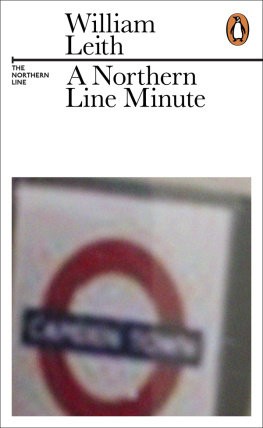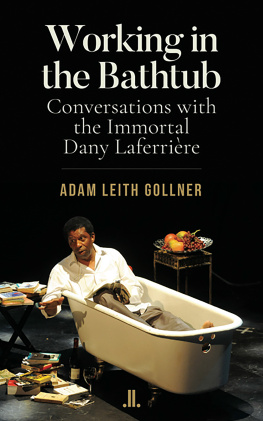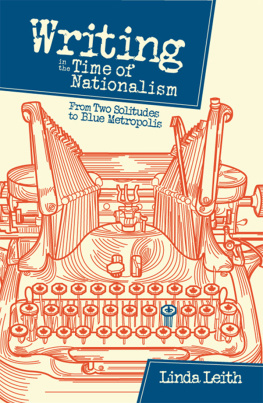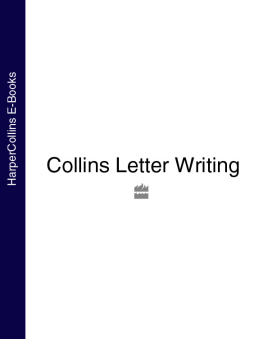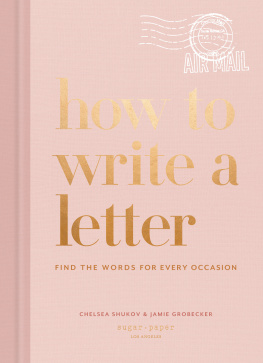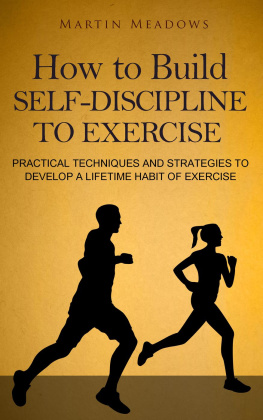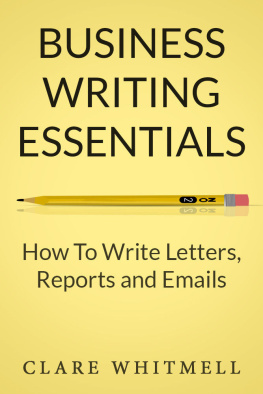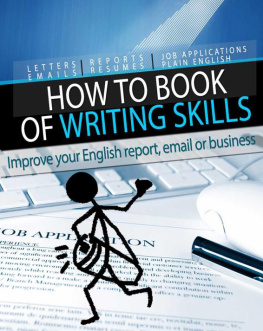WRITE TO THE POINT
Sam Leith is literary editor at the Spectator, contributes columns to the Financial Times, the Evening Standard and Prospect, and his work appears regularly in the Guardian, The Times and the TLS among others. His broadcasting work has included appearances on The Culture Show, The Review Show, Front Row, the News Quiz, Frys English Delight and a regular slot on the Sky Arts Book Programme.
ALSO BY SAM LEITH
Non-fiction
You Talkin to Me: Rhetoric from Aristotle to Obama
Dead Pets: Eat Them, Stuff Them, Love Them
Sods Law: Why Life Always Lands Butter Side Down
Fiction
The Coincidence Engine
WRITE TO THE POINT
HOW TO BE CLEAR, CORRECT
AND PERSUASIVE ON THE PAGE
SAM LEITH

First published in Great Britain in 2017 by
PROFILE BOOKS LTD
3 Holford Yard
Bevin Way
London WC1X 9HD
www.profilebooks.com
Copyright Sam Leith, 2017
Printed and bound in Great Britain by Clays, St Ives plc
The moral right of the author has been asserted.
All rights reserved. Without limiting the rights under copyright reserved
above, no part of this publication may be reproduced,
stored or introduced into a retrieval system, or transmitted, in
any form or by any means (electronic, mechanical, photocopying,
recording or otherwise), without the prior written permission
of both the copyright owner and the publisher of this book.
A CIP catalogue record for this book is available from the British Library.
eISBN 978 1 78283 173 0
For David Miller
CONTENTS
1
SURVIVING THE LANGUAGE WARS
MOST PUBLIC DISCUSSION of how language is used and certainly the most vociferous public discussion is concerned with mistakes. Should that be a capital letter? Is it different from or different to? Where should that comma go inside the quotation marks or outside them? On questions such as these, were encouraged to think, rests the difference between civilisation and barbarism.
These arguments have been characterised as language wars and they can look like that. The sound! The fury! To one side, the Armies of Correctness mass behind fortifications made not of sandbags but second-hand copies of Fowlers Modern English Usage, Gwynnes Grammar and Strunk and Whites Elements of Style. Heres Lynne Deadeye Truss, her sniper-rifle loaded with apostrophes, taking pot-shots at mispunctuated grocery advertisements; and theres Simon Mad Dog Heffer, preparing a shock-n-awe offensive involving the word decimate, which he hopes will reduce the enemy forces by a tenth.
On the other side, equally well dug in, are the Descriptivist Irregulars: a curious fighting force in which hippy-dippy schoolteachers battle shoulder-to-shoulder with austere academic linguists. There are a lot of cardigans. Someone has just pulled the pin and lobbed a split infinitive over the barricades. Now theyre sticking their tongues out and flicking V-signs and laughing. And, yes, I can just make out Geoffrey Pullum, looking peevish and tinkering with the controls of a devastating secret weapon they call only The Corpus.
At issue is whether there is a correct way to write. Are there, or should there be, rules about the meanings and spelling of words, the use of punctuation marks, and the formation of sentences? And if there are, or should be, who pronounces on them? Like the conflict in George Orwells Nineteen Eighty-Four, this war has been going on for as long as anybody can remember. In the Introduction to his The Sense of Style, the linguist Steven Pinker writes that complaints about the decline of language go at least as far back as the invention of the printing press. He quotes Caxton in 1478 beefing that certaynly our langage now vsed veryeth ferre from that whiche was vsed and spoken when I was borne.
Both sides because all armies have their propaganda wings will tend to caricature the positions of the other. Descriptivists see the Armies of Correctness as snobbish amateurs, obsessed with a set of prohibitions half-remembered from their own schooldays and essentially mistaken about how language works. Prescriptivists, meanwhile, see their opponents as smart-arsed ivory-tower types who, in trendily insisting that anything goes, actively collude in the coarsening and eventual destruction of the language they purport to study.
Intellectually, the Descriptivists are right. Nobody made the English language up. It isnt an invention, like tennis or a washing machine, where theres an instruction manual to which we can refer. It is not a fixed thing. It is a whole set of practices and behaviours, and it evolves according to the way it is used. One hundred years ago, wicked meant evil; now, in many contexts, it means excellent. Nobody decided that: it just to use a technical linguistic term sort of caught on. And if it just sort of catches on that gay is understood to mean homosexual, or decimate is understood to mean annihilate, no number of indignant letters to the Daily Telegraph will prevent that happening.
Does a language have rules? Yes, in one sense it does. It would not work if it didnt. But it doesnt have an umpire. It has rules in the same way that the acceleration of a body through space under gravity or the formation of a foetus in the womb have rules. The rules of language are a property of the system itself. And that system is a property of its day-to-day users.
You may think you dont know any grammar because, perhaps, you werent taught at school what a gerund is, or the difference between a conjugation and a declension. But every sentence you utter is grammatical: if it were not, nobody would be able to understand you. You conjugate I conjugate, he conjugates hell, we all conjugate like a champ, and use gerunds without even thinking about it. The grammar that is taught and written down in books is not a manual for language users: its a description of what they do.
That is where this book starts from. I take the part not of the Armies of Correctness nor of the Descriptivist Irregulars, but of the huddled civilian caught in the middle: cowering in the shelled-out no-mans land somewhere between them. And I want to try to present a practical way through.
I hope to acknowledge that there is real value in knowing where to put a question mark or how to spell accommodate and that the armies of proofreaders, sub-editors and schoolteachers who think about these questions are not labouring in vain. Ill have plenty to say in later sections about correct (or, more precisely, standard) usage and about the pointless myths that have grown up about it, too.
But I also want to get the language wars in proportion. Language is a social activity which is why these things matter. And yet its precisely because language is a social activity that these things change over time. Knowing your audience is always more important than knowing a set of rules and prohibitions. Correctness is part of the picture, but its not the whole or even the most important part of the picture.
Good writing is about much more than knowing how to frame a restrictive relative clause. It has to do with how you get a voice down on paper, how you make a sentence easy for your reader to take in, how you attend to the prose music that makes it pleasurable to read, how you make it fresh in idiom and vivid in image, and even how you present it on the page.
Almost all of us, in the first world, need to put pen to paper or stubby finger to keyboard daily. We write memos, emails, reports, presentations, CVs, blogs, tweets and letters of complaint, congratulation or supplication. Our working lives and our working relationships are shaped by how and what we write. To write clearly is an essential courtesy, and to write well is to give pleasure to your audience. You are not only making a case or imparting information; you are cultivating a relationship.
Next page

